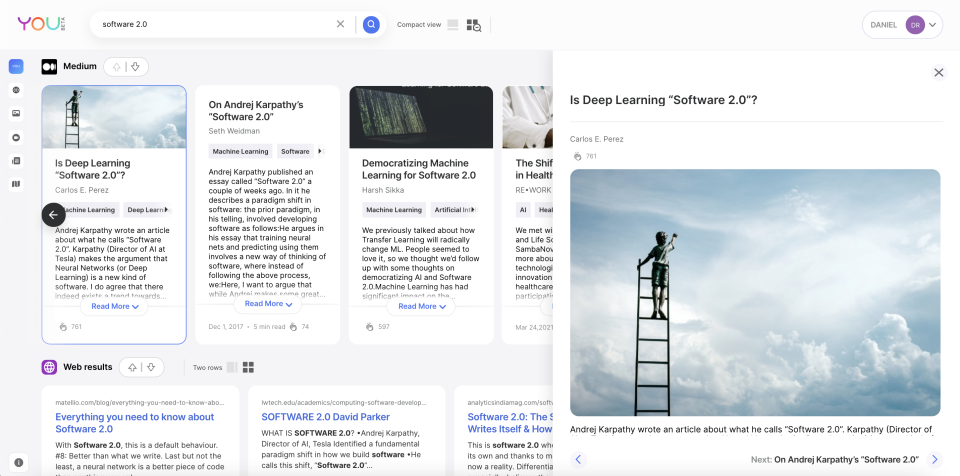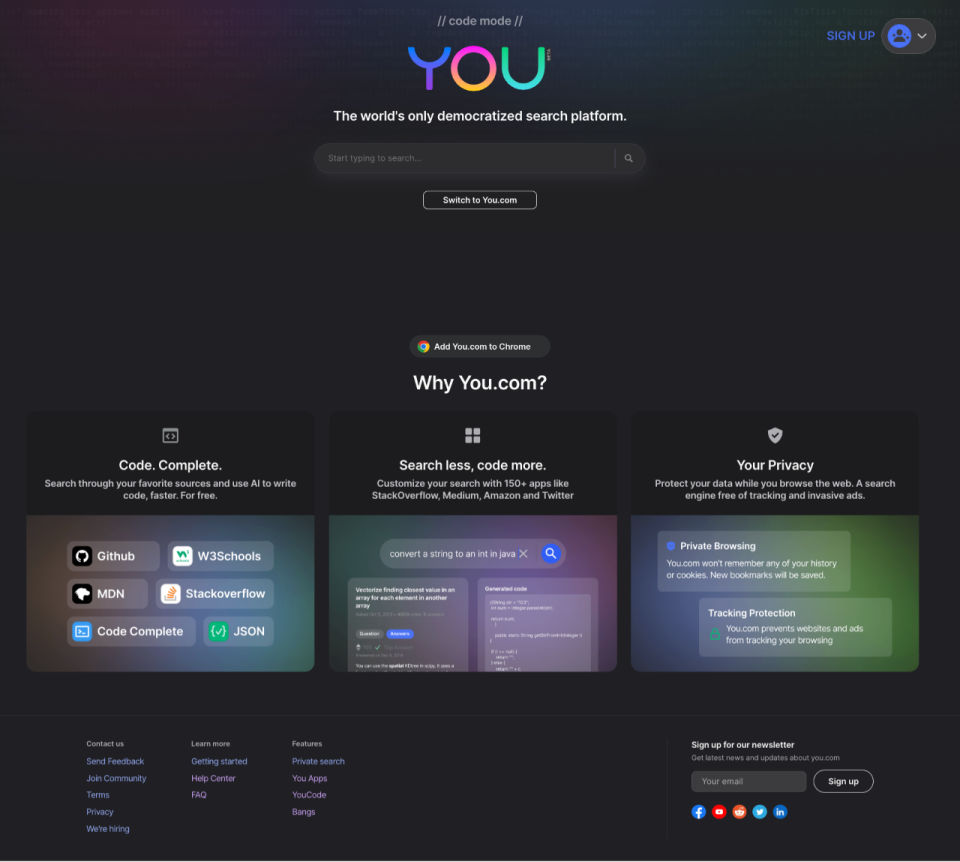You raises $25M to fuel its AI-powered search engine
There's a growing appetite for alternative search engines. At least, that's the crux of the argument Richard Socher, the former chief scientist at Salesforce, likes to make. In 2020, Socher co-founded You, a search engine that uses AI to understand search queries, rank the results and parse the queries into different languages (including programming languages). You summarizes information from across the web and offers built-in apps, like search tools for Twitter, that allow users to complete tasks without having to leave the results page.
It seems there's some truth to his words. Socher claims that You has hundreds of thousands of users, with 70% growth in sign-ups last month and 30% growth in unique searches month over month. While that pales in comparison to the world's most popular search engines (i.e., Google, Bing), which have hundreds of millions of users, Socher draws attention to You's retention rate. Fifty percent of people who set You as their default search engine continue to use it after the fact.
The numbers are to investors' liking. Today, You closed a $25 million funding round led by Radical Ventures with participation from Salesforce CEO Marc Benioff’s Time Ventures, Breyer Capital, Norwest Venture Partners and Day One Ventures. It brings the startup's total raised to $45 million, which Socher said will be put toward developing "premium features" and collaborating with outside developers to "show more useful actionable apps" in You's search results page.
"We envision You.com becoming a search platform that is open and allows others to build on top of all of the search technology that we’ve created. Data transparency, user customization, summarization, privacy and state of the art search are the foundation of our platform, and we beat Google in the long run by empowering the world to build the next search experience together," Socher told TechCrunch in an email interview. "Google is a monolithic, monopolistic search engine that is closed and has ultimately weaponized AI against users for the sake of serving its true purpose: advertising. We are building You.com as a search platform that is open and emphasizes directly serving user needs with You.com apps instead of bombarding people with ads."

Image Credits: You.com
Socher previously founded MetaMind, an AI startup that was acquired by Salesforce in 2016. While at Salesforce, Socher helped to build the company’s sprawling Einstein AI platform and worked with Bryan McCann, You's second co-founder, on natural language processing research.
Unsurprisingly given Socher's data science background, You sprinkles AI-enabled features liberally throughout the search experience. A capability newly launched today, YouCode can generate code along the lines of GitHub's Copilot based on a search query. And the recently debuted YouWrite, powered by OpenAI's GPT-3, can be prompted to write essays, blog posts and even boilerplate letters.
Socher sees apps, not ads, as a core piece of You's growth — a twist on the traditional search engine formula. (Advertising accounts for the majority of Google's revenue — $256.73 billion in 2021.) While it hasn’t ruled out introducing ads, You offers a "private mode" that doesn't store queries, preferences, IP addresses or location data and anonymizes the query data sent to You's third-party partners.
"Our private mode offers the most private search experience of any search engine. Users can also request a removal of their data and have full transparency in how [and] what data is used," Socher claims. "To the greatest extent possible, we believe the future is in apps not ads and that the economy will increasingly become one of showing over telling."
Certainly, You has been putting its money where its mouth is, investing substantial development in experiences like the aforementioned YouCode. In addition to generating code, YouCode can find code snippets from sources like Stack Overflow and GitHub and filter results relevant to a particular development environment and software stack. A special preview panel shows the top-level information from documentation published online, while built-in tools can validate JSON files and generate codes for colors in HEX, RGB and HSV.
While the bulk of You's apps were developed in-house, the next step is exposing the platform to third parties, Socher says. In the future, You will open access to its data sets and custom search technology so that developers can build on top of their internal data. At that point, You might begin charging for things like API access to features, "advanced" and "personalized" text and code generation and out-of-the-box support of search through internal developer knowledge bases.

Image Credits: You.com
It remains to be seen whether You's business model will be a winner. Other under-the-radar search engines, like Neeva, have gone different routes to monetization, charging for access to search results. Still others have struggled to find a reliable source of revenue — Cuil, which was founded by former Google engineers, raised $33 million in capital before shutting down in 2010, after just over 2 years in operation.
In any case, to Socher's earlier point, ads aren't likely to be the preferred way search engine startups make money. At the corporate level, privacy-forward features like Apple's App Tracking Transparency threaten to disrupt the behind-the-scenes mechanics of many ads, while regulators in the U.S. and abroad are eyeing restrictions on the amount of data advertisers can collect for targeting purposes — making certain ad products less attractive.
"We want to be an open entry to the internet instead of a closed gateway that taxes all the companies through an ad-network that is ultimately a bottleneck for progress in sharing information," Socher said, taking a dig at You.com's chief rivals. "A better search engine is possible — one with better privacy, better results for professionals like coders, less ads, more social results, less SEO sites, more choice and agency for people in the ranking."

 Yahoo Finance
Yahoo Finance 